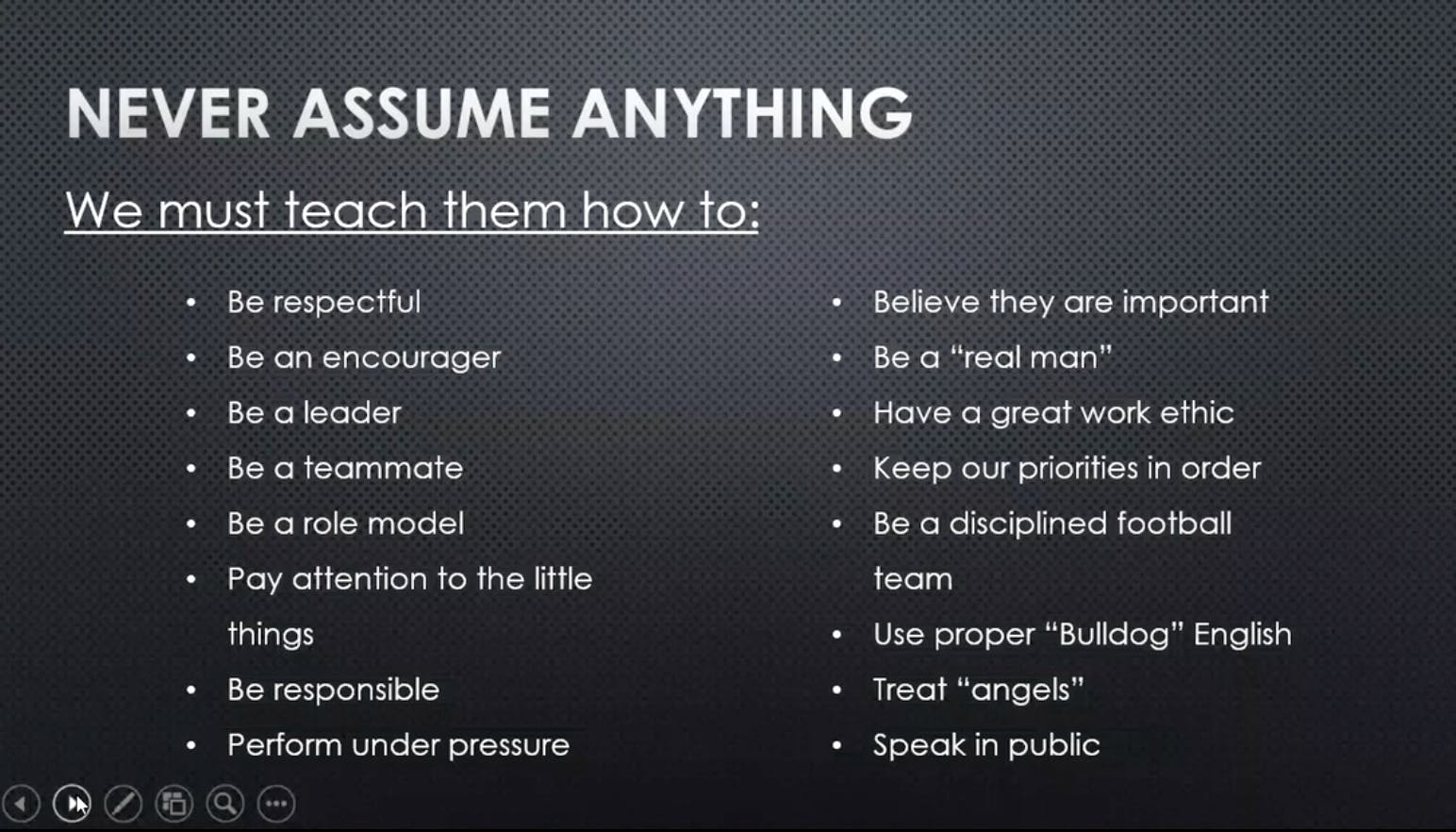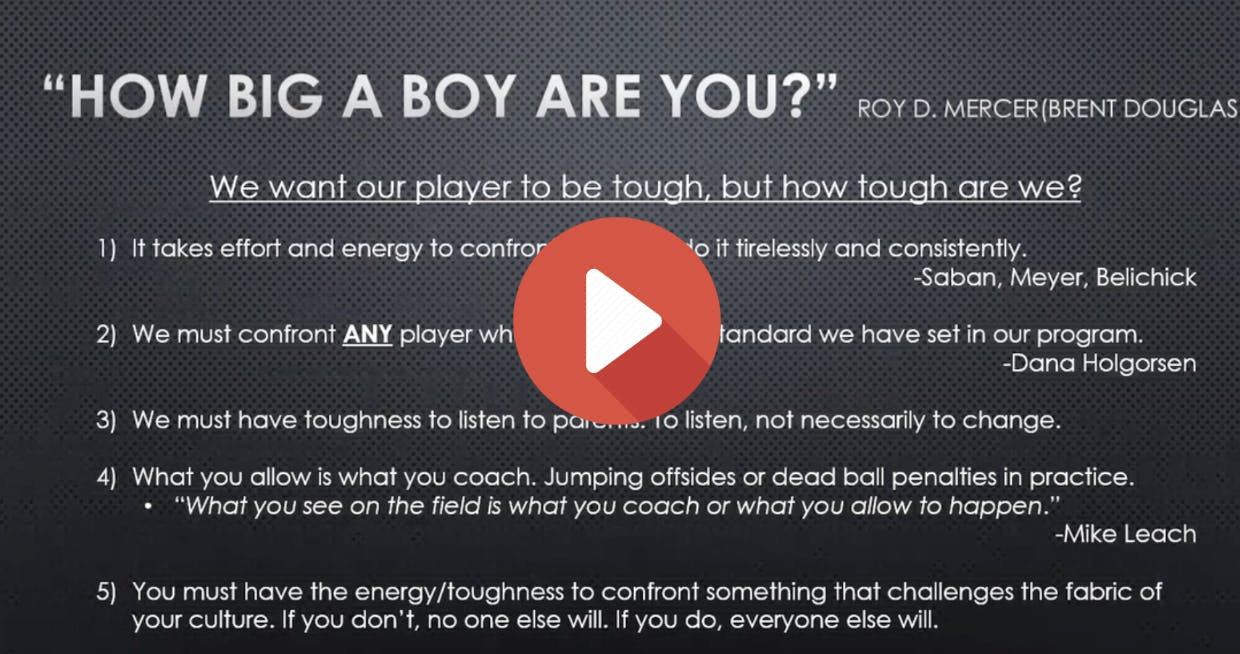
How to Be an Influential Football Coach
- By Grant Young
“If our purpose in high school football is not to change the lives of young men through the game of football, then, oh my goodness, we have wasted a lot of time.”
-Rick Jones, Assistant Coach, Mizzou
Coach Rick Jones knows a thing or two about curating player excellence on the football field.
And this man is among the best around in terms of conveying his message about how football is a microcosm for life, in a variety of different ways.
In his 31 seasons as a high school football head coach, Jones accumulated a record of 317-74 (with a winning percentage of 81%), and is an 18-time coach of the year honoree. He was also named the 2012 National Federation of High Schools National Football Coach of the Year, was named the 2018 AFCA Power of Influence National Coach of the Year, was inducted to the Oklahoma High School Coaches Association Hall of Fame (2013), and was inducted to the Harding University Athletic Hall of Fame (2016).
With all of these impressive accolades, it should come as no surprise that University of Missouri head coach Eliah Drinkwitz hired Coach Jones as his assistant when he took over the Tigers program in 2020.
Yet, while Coach Jones’ football knowledge is admirable, it’s how he can turn that knowledge into life and learning experience for his young players that's most remarkable.
His “What They Don't Teach You About Football” course has gained infamy over the years for the heartfelt message it conveys about coaching football. So we decided to pluck some gold from this course and expand upon some of Jones’ most poignant. teachings
Influence is Intentional
“Players make a choice every day to come into our locker room, to come out and play football. And we’ve got to be grateful for that. Because if we didn’t have those kids, we wouldn’t have a job.”
Showing gratitude is an integral part of Coach Jones’ football coach philosophy, and is something he considers essential when it comes to being an influential coach.
It’s important to remember that high school players don’t get paid a penny to play. While they could have signed up for a variety of reasons (because they love the game, because they want to make friends, or because they want to get out of their household for a few hours every day), the bottom line is that they choose to be on the field.
Coach Jones asserts that it’s the coach's job to make football “worth it” for their players. Because if it isn’t worth it, then why would they keep coming back? And if they don’t keep coming back then coaches wouldn’t be able to coach anymore.
Never Assume Anything
“When you’re a football coach, you must teach players everything. You cannot assume that they know it, you can not assume they’ve been taught at an earlier age.”
Youth football players — and all young men, for that matter — perform their best when they’re being uplifted and encouraged by their coaches. And because these players are always looking to their coaches for this encouragement, they’re going to pick up any body language you convey, which will either tell them they’re doing well or that they’re not doing well.
For this reason, being intentional about one’s body language is crucial to being an influential football coach. Coach Jones explains how he encourages with his mouth by calling players by their names, with his hands by clapping and cheering them on, and with his feet by showing enthusiasm and moving around. Even if you don’t realize it, your body language is always influencing your players. Coach Jones stresses, to maximize your impact on these young athletes, you will need to be aware of this at all times, and use your body language to your — and their — advantage.
How Big a Boy Are You?

“You’ve got to find a way to still be tough. It takes effort and energy to confront. You must do it tirelessly and consistently.”
Every football coach knows that football is a difficult sport. And sometimes, it takes a coach showing tough love if they’re to maximize their influence. Coach Jones is adamant about needing to confront any player who falls below your program’s standard. This will not only teach that player that they need to be accountable for their actions, but it will teach all other players that there are consequences when one isn’t showing up to the commitment they made.
Coach Jones also discusses toughness as it pertains to interacting with parents. He stresses that it’s important to listen to parents — although that doesn't necessarily mean you’re going to adhere to their requests.
Creating a culture of tough love is extremely hard, and it takes constant effort every single day, at every part of practice and games. But if a coach wants to help mold their players into young men, they have to remain diligent.
These are just a few of the valuable lessons that Coach Jones imparts in his course. And what we love about his teachings is that they’re based on real life stories and anecdotes that Coach Jones has experienced firsthand. These life experiences provide some refreshing perspective and validation about why we coaches do what we do.
But the final lesson that Coach Jones provides is perhaps the most important: never stop learning. As a coach, it can be easy to trick yourself into believing that they know everything about the sport they’ve dedicated their life to. But taking a step back and recognizing that coaches can learn something new every day from their peers, staff, and players is how one’s influences can expand into something truly special.
In his 42nd year, Coach Jones is still finding ways to learn every day. And we are thankful that he’s willing to share that knowledge with the world.


No comments:
Post a Comment